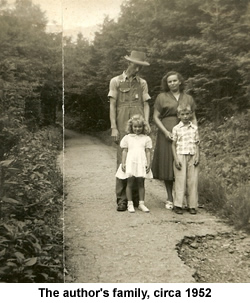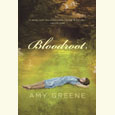Tennessee Truffles
When a beloved mother is aging and confused, The Food Channel can be a lifesaver
“Why, those looks like dog turds,” my mother laughs. We are watching The Food Channel in her room at the nursing home. The male chef with bleached spiky hair and earrings is cleaning truffles—brushing then wiping them with a damp cloth. They look like clumps of charcoal or… yes, they do resemble dog turds.
The Food Channel and Animal Planet are the only channels that appeal to my mother’s shortened attention span. She is eighty-eight and has some brain impairment due to age-related dementia. She can no longer follow plot lines, and since her hearing isn’t good, it’s the picture that counts. She especially likes commercials. Her favorite ran during the holidays, the one where a naked, headless turkey jumps out of the shopping cart and careens down the supermarket aisle. She still cracks up months later if I mention it.
 We watch with no sound so her roommate can watch, and listen to, Bonanza on her television. The recipes are most often dishes my mother has never eaten before, so I describe the ingredients for her. I’m not a foodie and so must sometimes rely on visual clues myself. I know what these black things are because the pre-show teaser read “Black Truffle Crostini.”
We watch with no sound so her roommate can watch, and listen to, Bonanza on her television. The recipes are most often dishes my mother has never eaten before, so I describe the ingredients for her. I’m not a foodie and so must sometimes rely on visual clues myself. I know what these black things are because the pre-show teaser read “Black Truffle Crostini.”
“God-a-mighty,” she says as the chef cuts into a truffle.
“Those are truffles,” I say.
“What’s a truffle?” she asks.
“It’s a rare kind of mushroom.”
“Shew, God!”
My mother never cared for mushrooms. “Like chewing snails,” she said. Even in healthier days, “Shew, God” was her response whenever someone mentioned mushrooms. Obviously, she agreed with Pliny who said that truffles are the excrement of the earth. But what can you expect? She grew up in Snowflake, Virginia, where mushrooms were disdained because they often sprouted from cow patties.
I’ve never eaten a truffle. Possibly because of her dislike of mushrooms, I’m ambivalent about them. I’m only fond of one variety, and that’s more because of its name, Hen of the Woods, than its taste. I can see the mythic little creatures scurrying through the underbrush, ruffled combs and camouflage capes flying. As my mother says, mushrooms are slick and rubbery, but as Julia Child said, anything sautéed in butter is good.
I doubt my mother ever ate a mushroom until the ’60s, when Campbell’s Soup Company made green bean and cream of mushroom soup casserole the most popular dish in the South.
The very word truffle conjures up Brideshead or Biltmore, the Gilded Age in which people took the Grand Tour, ate their truffles with old silver and washed them down with old Burgundy or old Borolo. In my mother’s world view, wealthy people can afford to indulge their foolishness. She was born on the Wise County Poor Farm, orphaned at age seven, and from then until she married my father was a servant on a farm in nearby Snowflake. I doubt my mother ever ate a mushroom until the ’60s, when Campbell’s Soup Company made green bean and cream of mushroom soup casserole the most popular dish in the South.
I wonder what she would make of truffle madness, a kind of smaller-scale tulip fever, which seems to have hit here in East Tennessee. I was surprised recently to learn that European truffles are to be found at Blackberry Farm, a tony inn in nearby Walland. Imagine, a hazelnut orchard planted specifically to cultivate truffles and enhance the Farm’s celebrated “Foothills Cuisine.” Italian truffle-sniffing dogs have been imported, a dog trainer employed. Unlike pigs, the most accomplished truffle hunters, dogs don’t like mushrooms—they’re just in it for the sport—and, therefore, don’t eat any of the profits. Last year two hundred pounds of truffles were sniffed out in these very foothills.
“You won’t believe this,” I tell my mother, “but at a farm near here they’re injecting fungus spores into the roots of oak and hazelnut trees and growing truffles.”
“Shi-it,” she scoffs.
 She says that word frequently, as well as the f-word. One of the symptoms of frontotemporal degeneration is lack of inhibitory controls. Of all the aging events over the past five years, the inappropriate language has been the most disconcerting because it has changed fundamentally the woman I call Mom. I never know what she will say. If it’s naughty, she cackles. Still, I’m thankful that at the end of her life she has humor and not anger or depression.
She says that word frequently, as well as the f-word. One of the symptoms of frontotemporal degeneration is lack of inhibitory controls. Of all the aging events over the past five years, the inappropriate language has been the most disconcerting because it has changed fundamentally the woman I call Mom. I never know what she will say. If it’s naughty, she cackles. Still, I’m thankful that at the end of her life she has humor and not anger or depression.
“It’s true. Truffles are delicacies. People will pay anywhere from five hundred to a thousand dollars a pound.”
“Shi-it.”
Although my mother never used foul language in her life, she never had patience with affectation, either. I remember telling her several years ago about my discovery of polenta. On one of my visits home, I took along a box of polenta mix to make for breakfast. She took one look at it and said, “Humph, that’s nothing but cornmeal mush.” My exotic, Italian dish reduced to an Appalachian, Depression-era gruel. But she was absolutely right.
The spike-haired chef is now adding a splash of amber liquid to his sauté skillet with the sliced truffles, garlic, and crushed peppercorns.
“Vinegar?” She screws up her face.
“No, that’s brandy.”
“Shi-it.”
I bring her afternoon coffee, her favorite treat, black with a scoop of vanilla ice cream. She calls it cappa-seeno. She drinks from the straw; her eyes widen like a child’s.
“I tell you what’s the truth,” she says, licking the vanilla foam from the end of the straw. It’s a phrase she uses constantly but rarely completes unless prompted.
“What’s the truth?” I ask, saddened by the irony, by the fact that she’ll never again be able to tell me what is true, to help me make sense of life.
“This stuff just won’t quit.”
I ask her what she had for lunch. She never remembers even a half hour later.
“I forget,” she said, “but I tell you what’s the truth….”
“What’s the truth?” I ask.
“It wasn’t truffles,” she grins.
Copyright (c) 2011 by Judy Loest. All rights reserved.


